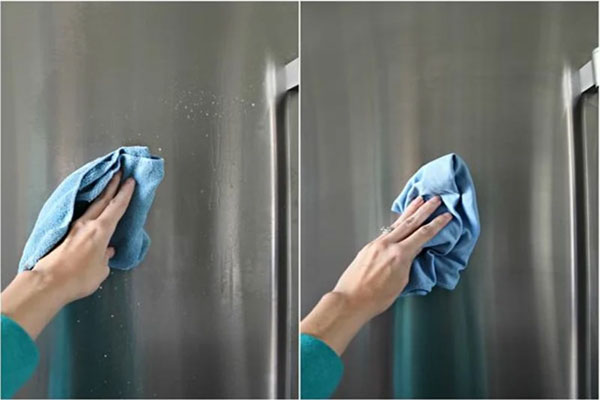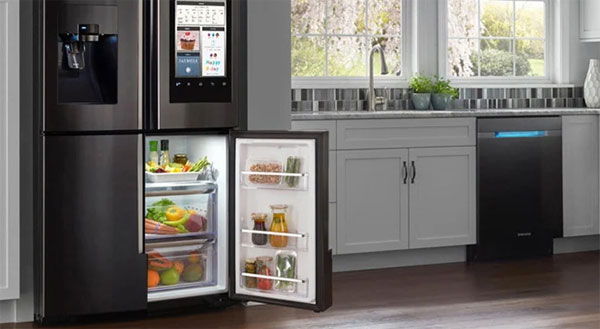1. Refrigerator Stops Working
 If your refrigerator suddenly stops working, don’t jump to conclusions. First, check the following:
If your refrigerator suddenly stops working, don’t jump to conclusions. First, check the following:
Ensure the power cord is intact and securely plugged into the outlet. Check if the fuse or circuit breaker is functioning properly.
Make sure the outlet isn’t overloaded or damaged by having too many plugs.
Solution
Regularly inspect the power cord and outlet for any damage, including potential chew marks from rodents.
Use a voltage tester to check for hidden wire breaks, and avoid plugging in too many appliances that run continuously into a single outlet.
2. Refrigerator Is Warm or Not Cold Enough
If your refrigerator is running but not cooling effectively, even when the temperature is set to the highest setting, consider the following reasons:
The refrigerator is placed in an area with direct sunlight.
The temperature is set to the lowest setting – the MIN level.
There is too much food in the refrigerator compared to its capacity, or warm food is being placed inside.
The door seal is faulty, or the door is frequently left open after retrieving items.
Solution
Position the refrigerator in a cool, shaded area, away from direct sunlight.
Store a moderate amount of food and regularly clean out expired items. After using the refrigerator, ensure the door is closed promptly to prevent cold air from escaping, reducing energy efficiency.
3. Condensation or Water Formation on the Door, Seal, or Exterior
 It’s common for refrigerators to develop condensation or water buildup on the door, seal, or exterior over time. This is usually due to humid weather conditions or a faulty door seal. The door gasket may have lost its elasticity or become torn, or the insulating foam may be damaged.
It’s common for refrigerators to develop condensation or water buildup on the door, seal, or exterior over time. This is usually due to humid weather conditions or a faulty door seal. The door gasket may have lost its elasticity or become torn, or the insulating foam may be damaged.
To address this, avoid placing the refrigerator near water sources or humid areas. Replace the door gasket or insulating foam if necessary to prolong the life of your appliance.
4. Food in the Chiller Compartment Freezes
If your chiller compartment food is freezing, it could be due to the following reasons:
The temperature is set too high.
Easily frozen foods like vegetables are placed too close to the cooling vents, exposing them to excessive cold air.
A faulty temperature sensor causes the compressor to run continuously, leading to higher temperatures and excessive cooling, resulting in frozen food.
Solution
Check and adjust the temperature setting if needed. Avoid placing food too close to the cooling vents, and ensure there’s adequate airflow by not overloading the compartment with food.
5. Noisy or Vibrating Refrigerator
 A noisy or vibrating refrigerator can be a nuisance. To address this, locate the source of the noise: the motor, fan, etc. Ensure the amount of stored food isn’t causing the motor to overload. Check that the interior shelves and trays are properly secured and that no foreign objects have fallen into the rear machinery. Ensure the refrigerator is level and that the legs are tight and secure.
A noisy or vibrating refrigerator can be a nuisance. To address this, locate the source of the noise: the motor, fan, etc. Ensure the amount of stored food isn’t causing the motor to overload. Check that the interior shelves and trays are properly secured and that no foreign objects have fallen into the rear machinery. Ensure the refrigerator is level and that the legs are tight and secure.
6. Ice Formation Takes a Long Time
If your ice formation is slow, it could be due to the following reasons: Excessive ice buildup in the freezer compartment blocks cold air from entering. Plastic ice trays, which are larger and hold more water, take longer to freeze. The door gasket is damaged or doesn’t seal properly.
If none of these issues are present, the cooling gas in your refrigerator may have leaked, affecting its ability to freeze ice. In this case, contact a repair technician.
Additionally, regularly check the thickness of the ice buildup in the freezer compartment and remove excess ice to prevent it from becoming too thick. Use smaller ice trays made of aluminum or stainless steel, ensuring they don’t block the air vents.
7. Electric Shock When Touching the Refrigerator
 If you experience a tingling sensation or pain when touching your refrigerator, it could be due to an electrical fault or wet hands. To prevent this:
If you experience a tingling sensation or pain when touching your refrigerator, it could be due to an electrical fault or wet hands. To prevent this:
Wear indoor shoes to insulate yourself from potential electrical currents.
Ensure your hands are dry before opening the refrigerator.
Use an electrical tester pen to locate any electrical faults.
Grounding the refrigerator is the best safety measure.
8. Excessive Frost Buildup
Excessive frost reduces storage space and increases electricity consumption. This could be due to a blown thermal fuse, a faulty defrost heater, or a blocked defrost drain. To address this, first, remove the excess frost buildup. If the issue relates to the fuse or defrost heater, contact a technician for inspection and repair.
According to Saigonthethao





























